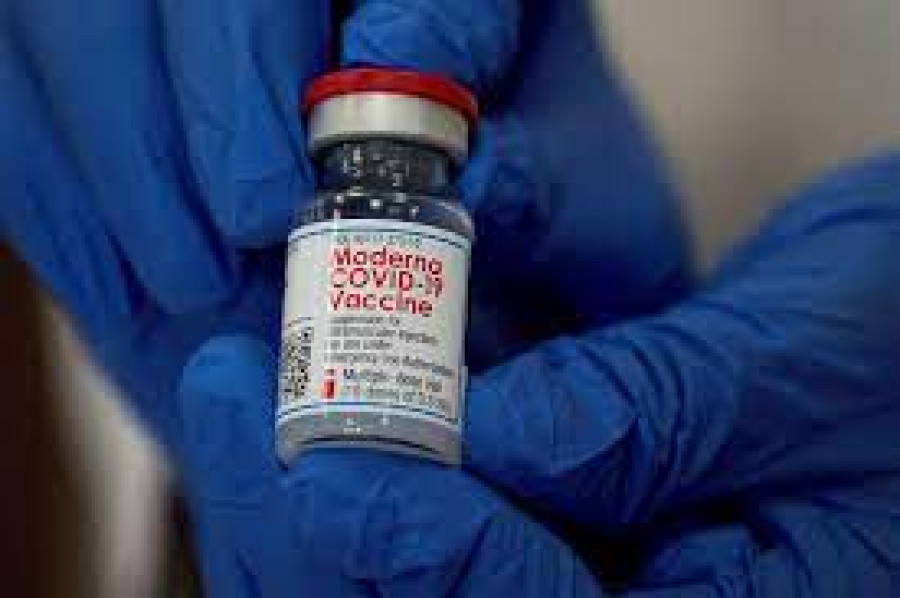Health
COVAX delivering 188,000 doses of Moderna vaccine today
Public health experts advise speeding up vaccination drives and providing booster shots to frontline workers, who were immunised 11 months ago, to prepare them for the worst.
Arjun Poudel
Nepal will receive 188,000 doses of the Moderna vaccine on Friday from the COVAX facility, the international vaccine sharing scheme backed by the United Nations. This is part of the 3,712,000 doses of Moderna vaccine committed by the facility.
“We will be receiving 188,000 doses of the Moderna vaccine from the COVAX facility tomorrow (Friday),” Sagar Dahal, chief of the National Immunisation Programme, confirmed.
Moderna vaccine will be the fifth Covid-19 vaccine to be used in Nepal after AstraZeneca, Vero Cell, Janssen and Pfizer-BioNTech Covid-19 vaccines.
Moderna vaccines need to be stored in minus 20 degrees Celsius.
“We have already stored Pfizer-BioNTech Covid-19 vaccine in minus 70 degrees Celsius,” said Badebabu Thapa, a senior official at the Logistic Management Section under the Department of Health Services.
“So there won’t be any problem when it comes to storing the Moderna vaccine in minus 20 degrees Celsius.”
Earlier on October 25, COVAX supplied 100,620 doses of the Pfizer-BioNTech vaccine to Nepal, which were administered to the people with compromised immunity and to children between 12 and 17 years.
The Ministry of Health and Population said that the priority group for Moderna vaccine has not been decided yet and that a decision will be taken once the Vaccine Advisory Committee makes the recommendation.
Officials said that the vaccine will most likely be administered to children between 12 and 17 years.
“Moderna vaccine can be administered to children above 12,'' said Dr Shyam Raj Upreti, coordinator of the Covid-19 Vaccine Advisory Committee.
Authorities have also purchased 4 million doses of the Moderna vaccine through COVAX’s cost-sharing scheme using the Asian Development Bank’s loan. The doses are expected to be delivered within the first quarter of 2022.
The COVAX facility had supplied 972,000 doses of Covishield, the AstraZeneca type vaccine manufactured by the Serum Institute of India, on Tuesday and 725,550 doses on Sunday.
The said doses of the AstraZeneca vaccine were part of the 6,039,000 doses the facility had pledged to deliver within December.
Officials at the Health Ministry said that the facility will also supply 2,188,800 doses of the single-shot Janssen, and 3,364,000 doses of the AstraZeneca vaccine, which are scheduled to arrive within December.
Apart from this, the government has bought 6 million doses of the Pfizer-BioNTech vaccine from the US using a loan from the World Bank.
As the risk of the spread of Omicron, a highly contagious variant of SARS-COV-2 that causes Covid-19, grows, public health experts suggest speeding up the vaccination drive.
They said that as many things—severity and death rate of the new variant— are yet to be known, authorities should try their best to administer all the jabs at the earliest.
“Along with administering the jabs to those, who have not yet taken, time has also come to provide booster shots to frontline workers,” said Dr Prabhat Adhikari, an infectious disease and critical care expert. “We have to keep the frontline workers ready to deal with any surge.”
As most of the frontline workers were inoculated in January and February, antibodies gained from the vaccine might have started to decline in the frontline workers, doctors say.
“If possible it would be better to provide shots to the elderly population also,” said Adhikari. “Providing booster shots will not only help to keep the frontline health workers ready to attend to patients but also helps to lessen the chances of the virus spreading from them.”
The World Health Organisation warned on Monday that the Omicron variant carries a very high global risk of infection surges. As more countries reported cases, the variant has prompted border closures.
Nepal so far has received 24,861,440 doses of Covid-19 vaccines—Vero Cell, AstraZeneca, Janssen and Pfizer-BioNTech.
Nepal launched its Covid-19 vaccination campaign on January 27 this year with 1 million doses of Covishield gifted by India.
Nepal needs to vaccinate around 78 percent of its over 30 million estimated population, or around 25 million people, as per the government’s new plan that includes those aged between 12 and 18 years. Earlier, the government had planned to vaccinate only those aged 15 years and above.
Since around 4-5 million people are said to be living abroad, the government needs to vaccinate around 19-20 million people. For this, the country needs a little over 40 million doses of double-shot vaccines.
As of Thursday, 8,559,224 people (28.2 percent of the total population) have been fully vaccinated.
In the last 24 hours, six people died of Covid-19. The Health Ministry says 315 people tested positive on Thursday (298 in 9,511 polymerase chain reaction tests, and 17 in 1,892 antigen tests).
Active cases stand at 7,045 throughout the country.
So far,11,535 people have died of Covd-19 infection.




 11.43°C Kathmandu
11.43°C Kathmandu















